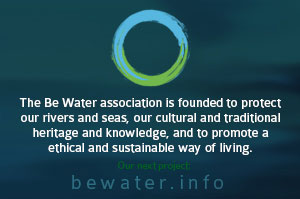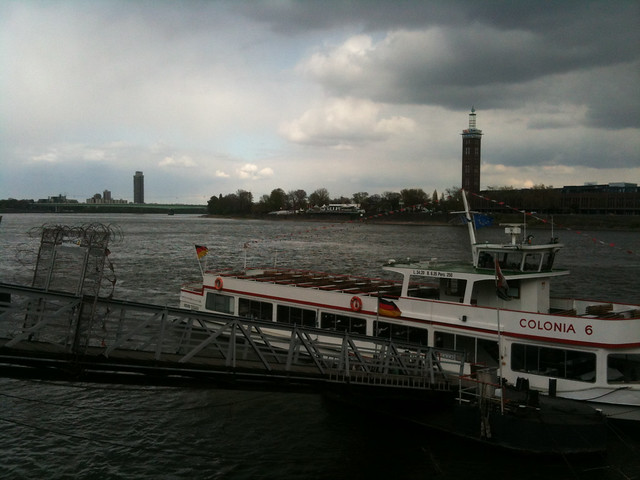
Köln, a former Roman Colony. It once was a wonderful city, but 77 minutes of wretched bombing destroyed it almost totally in a woeful day of the last century. Cologne boasted the best roman aqueduct north of the Rhenus (the Italian river Reno near Bologna). The Romans were masters in moving water: Probably more skilled than us and certainly much more respectful.
I’m currently writing from aside a fast flowing Rhine. Right now I could sail it upstream since the wind is so strong.
I can’t wait to get back on Clodia, I miss it so much. Foggy mornings, cold, mist, scents from the river. I just finished reading a nice book, “Il respiro delle acque” (The breath of the waters”), telling the story of a great man who has done a lot for the rivers: Renzo Franzin. This book was a gift from Eriberto Eulisse from “Civiltà delle Acque” (“Civility of Waters”). We’ll catch up soon.
But, what am I doing here in Cologne? Working for water once again: I’m planning a new project with the help of a few friends. After arriving to Istanbul I’ll write more about it, we’re still at a very early stage.
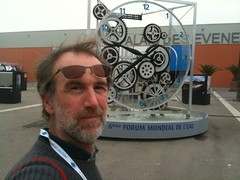 I have to tell you very briefly about the World Water Forum in Marseille.
I have to tell you very briefly about the World Water Forum in Marseille.
Here I’ve seen many white collars who love water just when it serves them to make money, opposed to some others who truly care and fight for water protection. The most pathetic thing was the Kyrgyzstan stand, promoting their glaciers and the dams that could be built to sell water and energy. Merchants. (more…)
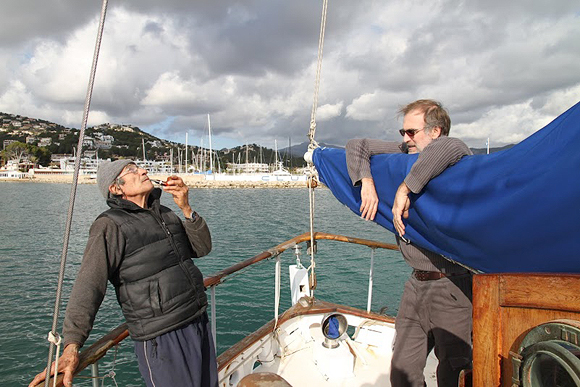
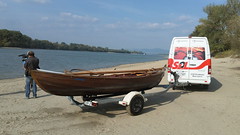 Last time I wrote, I was in Budapest. In the meantime, Clodia has taken a most deserved sleep under a blue sheet and a blanket of snow and ice, that has caused so many troubles around the Danube this year. I’ll soon get to see what’s left of this tough winter. After taking a few days of rest in Venice along with my parents, my best friends (Kaos & Nix) and a few other very close people, I reached my beloved boat (and house) Brancaleon.
Last time I wrote, I was in Budapest. In the meantime, Clodia has taken a most deserved sleep under a blue sheet and a blanket of snow and ice, that has caused so many troubles around the Danube this year. I’ll soon get to see what’s left of this tough winter. After taking a few days of rest in Venice along with my parents, my best friends (Kaos & Nix) and a few other very close people, I reached my beloved boat (and house) Brancaleon.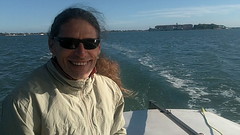 A dear friend of mine, skipper Stefano Leon Rodriguez, sailed it in just 12 days from Kos to Port de Pollença in Mallorca: 1.200 miles east to west.
A dear friend of mine, skipper Stefano Leon Rodriguez, sailed it in just 12 days from Kos to Port de Pollença in Mallorca: 1.200 miles east to west.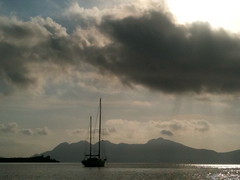 However I underestimated the task. My winter has been all about scratching, sawing, painting and cleaning.
However I underestimated the task. My winter has been all about scratching, sawing, painting and cleaning.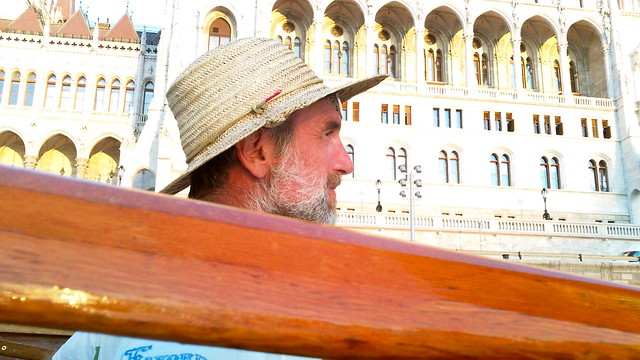
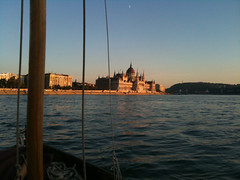 Winter is quickly coming and Budapest is a very important milestone: To keep going on would have been a shame, because I’ve so many things to do anyway.
Winter is quickly coming and Budapest is a very important milestone: To keep going on would have been a shame, because I’ve so many things to do anyway.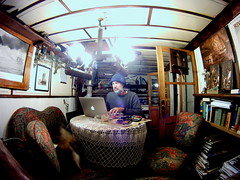 In Wien too there something to be done: Remember Franz, the captain, and the imperial tugboat Frederic Mistral, that of Franz Joseph? Well, Franz offered me to use the boat and its rooms at will, should I have decided to stay there.
In Wien too there something to be done: Remember Franz, the captain, and the imperial tugboat Frederic Mistral, that of Franz Joseph? Well, Franz offered me to use the boat and its rooms at will, should I have decided to stay there.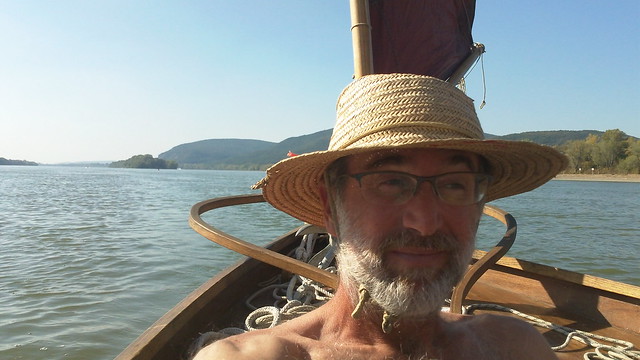
 But when I get closer to listen what they’re saying, I can’t understand a single word. It’s strange, one of the hardest languages of the planet sounds a bit like Italian if not listened carefully. The Hungarian, belonging to the Ugro-Finnic group of languages, reminds me a little of Lombard speaking.
But when I get closer to listen what they’re saying, I can’t understand a single word. It’s strange, one of the hardest languages of the planet sounds a bit like Italian if not listened carefully. The Hungarian, belonging to the Ugro-Finnic group of languages, reminds me a little of Lombard speaking. A wonderful book written in the second half of the 16th century by Francesco Tatti (who loved to be called “Francesco Sansovino” from the nom de plume of his dad Jacopo Tatti aka “Sansovino”, famous architect and scholar in Florence and Venice), was titled “De Barbari, onde ebbe origine l’inclita città di Venexia” (Barbarians, origin of the glorious city of Venice). It tells how the legendary birth of the city, on March 23rd 421, was a consequence of the heavy invasions by Attila in 352, that destroyed and scared the roman colonies along the Veneto coastline.
A wonderful book written in the second half of the 16th century by Francesco Tatti (who loved to be called “Francesco Sansovino” from the nom de plume of his dad Jacopo Tatti aka “Sansovino”, famous architect and scholar in Florence and Venice), was titled “De Barbari, onde ebbe origine l’inclita città di Venexia” (Barbarians, origin of the glorious city of Venice). It tells how the legendary birth of the city, on March 23rd 421, was a consequence of the heavy invasions by Attila in 352, that destroyed and scared the roman colonies along the Veneto coastline.
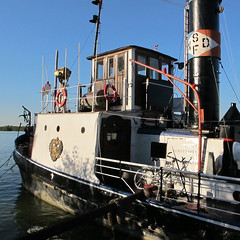 Clodia is quietly sleeping next to it. I can hear the Danube water since I’m about three quarters below its level. I have the rare privilege to work inside this historical gem, a cat purring on my knees.
Clodia is quietly sleeping next to it. I can hear the Danube water since I’m about three quarters below its level. I have the rare privilege to work inside this historical gem, a cat purring on my knees.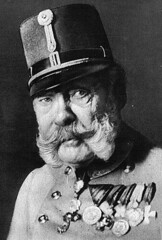 It was used for tugging but also to control the waterways, hosting aboard a very special guest: No less than Franz Joseph, the emperor.
It was used for tugging but also to control the waterways, hosting aboard a very special guest: No less than Franz Joseph, the emperor.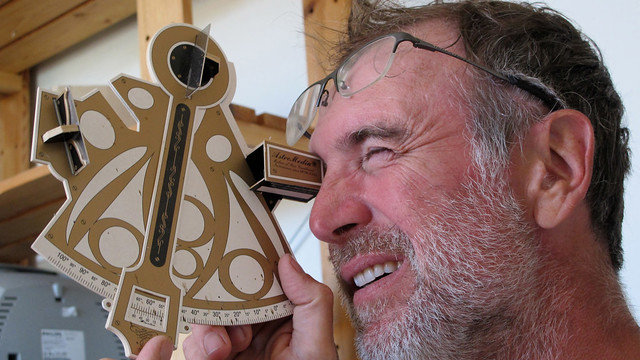
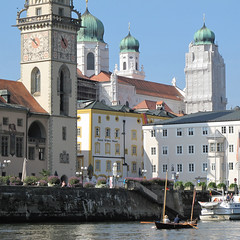 Passau is beautiful: Three rivers, three waters, rocks, tourism and life. The Inn is the biggest of the rivers and the most powerful, thanks to the glaciers feeding it.
Passau is beautiful: Three rivers, three waters, rocks, tourism and life. The Inn is the biggest of the rivers and the most powerful, thanks to the glaciers feeding it.